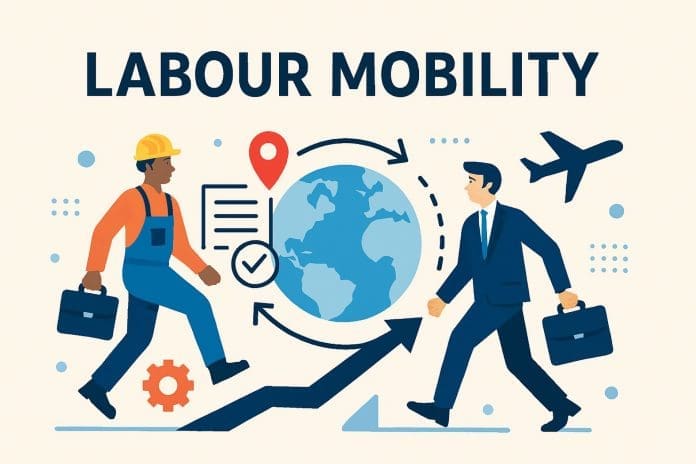The export of African labour overseas has long been a complex issue, with economic, social, and political dimensions. While many African nations send workers abroad in search of better economic opportunities, the practice sparks debate about its long-term impact on the continent.
The Economic Lifeline
For many African countries, labour export serves as a crucial economic strategy. Migrant workers send billions in remittances, sustaining families and injecting foreign currency into national economies. Nations such as Ghana, Nigeria, and Ethiopia rely heavily on these financial flows to stabilise their economies, fund infrastructure projects, and stimulate domestic consumption.
Moreover, international employment provides workers with access to higher wages, specialised skills, and career advancement opportunities that might be scarce in their home countries. In industries like healthcare, construction, and domestic work, African professionals fill critical labour shortages in developed nations, demonstrating the global value of African expertise and resilience.
The Brain Drain Dilemma
Despite the financial benefits, exporting labour comes at a cost, often referred to as the “brain drain.” Highly skilled professionals, particularly in healthcare and engineering, leave their home countries in search of better wages and working conditions. This depletes Africa’s talent pool, slowing progress in essential sectors such as healthcare, technology, and education.
Countries like South Africa and Kenya have faced shortages of doctors and engineers, as many professionals migrate to Europe, North America, and the Middle East. The loss of intellectual capital raises concerns about Africa’s ability to achieve sustainable development and compete in the global economy.
The Social and Cultural Impact
Beyond economics, labour migration affects families and societies. Many workers endure challenging conditions abroad, including discrimination, exploitation, and limited legal protections. Family separation is another consequence, as parents leave children behind to seek opportunities overseas. This creates emotional and psychological burdens that impact generations.
Additionally, the dependence on foreign job markets exposes African economies to risks. Global recessions, changing immigration laws, or geopolitical tensions can disrupt employment opportunities for migrant workers, cutting off a vital source of income.
Striking a Balance
African nations must find a balance between benefiting from labour exports and investing in domestic opportunities. Strengthening local industries, improving wages, and creating favourable working conditions could reduce the incentive for migration while retaining skilled talent. Initiatives like skill development programs, foreign worker protection policies, and strategic partnerships with host countries can ensure that labour exports remain beneficial rather than detrimental.
Ultimately, African labour migration is both an opportunity and a challenge. It drives economic growth but also raises questions about sustainability, dependency, and national development. As African governments navigate this landscape, the goal should be to harness the benefits of international labour opportunities while ensuring that homegrown talent thrives on the continent.
What do you think—should African countries focus more on keeping talent at home or embrace labour exports as a necessary strategy?
Ghana and Serbia on labour mobility
Ghana and Serbia have announced plans to sign a Memorandum of Understanding (MoU) on labour mobility. This agreement will enable Ghanaian workers to benefit from Serbia’s 100,000 work permit initiative, making Ghana the second African country, after Egypt, to effectively access this opportunity.
The MoU is part of a broader effort to address unemployment in Ghana by creating overseas job opportunities, filling labour shortages in Serbia, especially in sectors where Ghanaian professionals are in demand, and deepening bilateral relations, which also include cooperation in artificial intelligence, lithium exploration, defence, and maritime security.
The initiative was announced during a three-day official visit to Ghana by Serbia’s Foreign Minister, Marko Đurić, and reflects a renewed commitment to structured migration and economic collaboration.
In July, the Minister of Foreign Affairs, Samuel Okudzeto Ablakwa, told news reporters in Accra after a closed-door meeting with his counterpart from Serbia, Marko Đurić, who is on a three-day working visit to the country, the two countries, through several agreements, were strengthening their bilateral relations, focusing on lithium exploration, artificial intelligence, maritime security and defence cooperation.
He revealed that Ghana and Serbia had agreed to share technical expertise in lithium exploration.
“Serbia has 11 per cent of the world’s lithium deposits, and we have agreed on technical expertise sharing of knowledge so that we can work together on how we explore those lithium potentials,” he said.
The minister stated that the two countries would deepen their collaboration in artificial intelligence, with Serbia currently chairing the Global AI Initiative.
This partnership, he said, also aligned with the Ghana government’s One Million Coders Programme and the One Billion Dollar Innovation Hub Initiative.
He revealed that Ghana and Serbia had also discussed defence cooperation to strengthen defence ties between the two nations and also equip the Ghana Armed Forces to withstand the threat of terrorism.
Samuel Okudzeto Ablakwa also stated that the country would offer scholarship opportunities to Serbians to enrol for some courses, including African Sociology and African Studies at the University of Ghana.
Opportunities
The Serbian Minister of Foreign Affairs, Marko Đurić, expressed optimism about the opportunities Serbia and Ghana could benefit from.
He described the Ghana government’s 24-hour economy policy as an inspiring one, which offered opportunities for Serbian and other European businesses to connect with Ghanaian businesses.
Mr Đurić said, “The Serbian government sees Ghana as a key regional ally and partner, deeply rooted in historic friendship, but oriented towards contemporary and future cooperation”.
The Serbian Foreign Affairs Minister emphasised that his government also intended to extend its cooperation to agriculture, sports, and defence.
He revealed that the Serbian government had offered 51 scholarships to Ghanaian students to further their studies in various fields in Serbia. He also announced that Ghanaian students this year, as part of the bilateral relations with Ghana, would benefit from an additional 30 scholarship slots in 2025.
Source: newsghana.com.gh











